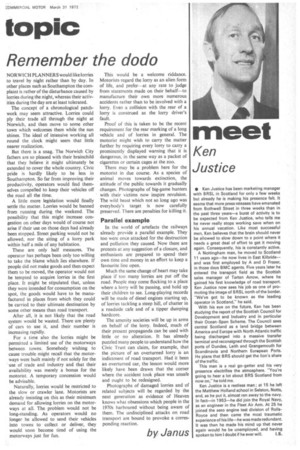topic
Page 37

If you've noticed an error in this article please click here to report it so we can fix it.
Remember the dodo
NORWICH PLANNERS would like lorries to travel by night rather than by day. In other places such as Southampton the complaint is rather of the disturbance caused by lorries during the night, whereas their activities during the day are at least tolerated.
The concept of a chronological patchwork. may seem attractive. Lorries could ply their trade all through the night at Norwich, and then move to some other town which welcomes them while the sun shines. The ideal of intensive working all round the clock might seem that little nearer realization.
But there is a snag. The Norwich City fathers are so pleased with their brainchild that they believe it might ultimately be extended to cover the whole country. Civic pride is hardly likely to be less in Southampton. So far from improving their productivity, operators would find themselves compelled to keep their vehicles off the road all the time.
A little more legislation would finally settle the matter. Lorries would be banned from running during the weekend. The possibility that this might increase congestion on other days would of course not arise if their use on those days had already been stopped. Street parking would not be allowed, nor the siting of a lorry park within half a mile of any habitation.
These are only half measures. The operator has perhaps been only too willing to take the blame which lies elsewhere. If people did not make goods and then expect them to be moved, the operator would not be tempted to acquire lorries in the first place. It might be stipulated that, unless they were intended for consumption on the spot, the goods would have to be .manufactured in places from which they could be carried to their ultimate destination by some other means than road transport.
After all, it is not likely that the road system would be wasted. There are plenty of cars to use it, and their number is increasing rapidly.
For a time also the lorries might be permitted a limited use of the motorways between towns. Somebody wishing to cause trouble might recall that the motorways were built mainly if not solely for the use of trade and industry and that their availability was merely a bonus for the motorist. A temporary concession would be advisable.
Naturally, lorries would be restricted to the slow or crawler lane. Motorists are already insisting on this as their minimum demand for allowing lorries on the motorways at all. The problem would not be long-standing. As operators would no longer be allowed to send their vehicles into towns to collect or deliver, they would soon become tired of using the motorways just for fun. This would be a welcome riddance. Motorists regard the lorry as an alien form of life, and prefer—at any rate to judge from statements made on their behalf—to manufacture their own more numerous accidents rather than to be involved with a lorry. Even a collision with the rear of a lorry is construed as the lorry driver's fault.
Proof of this is taken to be the recent requirement for the rear marking of a long vehicle and of lorries in general. The motorist might wish to carry the matter further by requiring every lorry to carry a prominently displayed warning that it is dangerous, in the same way as a packet of cigarettes or certain cages at the zoo.
There may be a problem here for the motorist in due course. As a species of animal moves towards extinction, the attitude of the public towards it gradually changes. Photographs of big-game hunters with their victims now inspire revulsion. The wild beast which not so long ago was everybody's target is now carefully preserved. There are penalties for killing it.
Parallel example
In the world of artefacts the railways already provide a parallel example. They too were once attacked for the destruction and pollution they caused. Now there are protests at any suggestion of a closure, and enthusiasts are prepared to spend their own time and money in an effort to keep a favourite line open.
Much the same change of heart may take place if too many lorries are put off the road. People may come flocking to a place where a lorry will be passing, and hold up their children to see. Long-playing records will be made of diesel engines starting up, of lorries tackling a steep hill, of chatter in a roadside cafe and of a tipper dumping hardcorc.
The amenity societies will be up in arms on behalf of the lorry. Indeed, much of their present propaganda can be used with little or no alteration. It has already puzzled many people to understand how the Civic Trust can claim, for example, that the picture of an overturned lorry is an indictment of road transport. Had it been an overturned car, the lesson would more likely have been drawn that the corner where the accident took place was unsafe and ought to be redesigned.
Photographs of damaged lorries and of related subjects will be regarded by the next generation as evidence of Heaven knows what obsessions which people in the 1970s harboured without being aware of them. The undisciplined attacks on road transport are bound to provoke a corresponding reaction.
by Janus




















































































